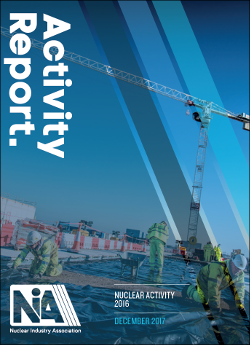Ungated Post | 05 Dec 2017
Nuclear Activity Report 2016

The Nuclear Activity Report presents a comprehensive study of the UK’s civil nuclear industry. For the first time in the annual series, Oxford Economics undertook an analysis of the economic contribution the civil nuclear industry makes to the UK and its nations and regions, supporting economic output, jobs and tax revenues across the length and breadth of the country.
The assessment found that the civil nuclear industry directly employed more than 65,000 people, contributed £6.4 billion gross value added to GDP and paid around £2.8 billion in taxes in 2016. When considering the wider impact of the industry’s spending with UK suppliers and payment of wages, this contribution rises to £12.4 billion gross value added, 155,000 jobs and £4.5 billion in tax receipts.
The civil nuclear industry’s benefits to the UK economy go far beyond this core economic contribution.The industry delivers supply side economic benefits through its investments in training and capabilitie development. Civil nuclear companies employed some 1,940 apprentices and 1,070 workers on graduate schemes in 2016. The substantial research and innovation activities undertaken by the civil nuclear industry deliver further productivity benefits, which diffuse throughout the economy in a ‘spillover’ effect.
Oxford Economics’ team is expert at applying advanced economic tools that provide valuable insights into today’s most pressing business, financial, and policy issues.
To find out more about our capabilities, contact:
Americas
Diantha Redd
+1 (646) 503 3052
Email
Asia Pacific
Peter Suomi
+65 6850 0110
Email
EMEA
Aoife Pearson
+44 (0)203 910 8054
Email
Related Services

Post
The Economic Footprint of JLR in the UK
This report examines the economic footprint of JLR in the United Kingdom in 2024. The analysis is conducted both at the national level, as well as on the West Midlands and North West regions, where JLR’s main facilities are located.
Find Out More
Post
Airbnb’s Economic Contribution to APAC in 2024: GDP, Jobs, and Regional Impact
Airbnb's platform connects hosts across Asia Pacific (APAC) with travellers from around the world. Oxford Economics was commissioned by Airbnb to quantify its economic footprint in 10 APAC markets in 2024.
Find Out More
Post
Economic Insights: Airbnb’s Contribution Through the Lens of Oxford Economics
Oxford Economics Australia delivered a tailored economic impact assessment for Airbnb, including GDP contribution modelling, job creation analytics, guest‑spend segmentation, and regional tourism dispersion insights to underpin Airbnb’s stakeholder communications and strategic growth initiatives.
Find Out More